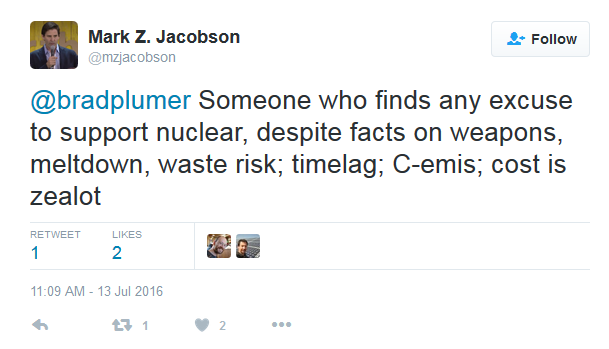New York State’s Department of Public Service has put forward a Clean Energy Standard proposal that values renewables and keeps existing low carbon nuclear energy operating. This is a hugely positive step, and a path that other states should follow. But before I get into the details, a little background.
Many states around the country have Renewable Portfolio Standards (RPS) which specifies a renewable energy goal (or goals) which that state wants to meet. For example, California has an RPS which requires that 33% of electricity is produced by renewables by 2030. However, almost all of these states do not include nuclear energy in the RPS, meaning there is an additional incentive for the US to build new renewables, but not new nuclear.
In a more roundabout way though, an RPS that excludes nuclear energy can actually create incentives to close nuclear energy facilities. This was certainly part of the decision to close Diablo Canyon; Tony Earley, PG&E’s Chief Executive, said exactly this to the SFGate,
I am sorry to see it go, because from a national energy policy standpoint, we need greenhouse gas-free electricity. But we are regulated by the state of California, and California’s policies are driving this. I’m not criticizing those policies, but it’s a fact.
Nuclear also produces electricity at an extremely steady rate, normally it operates at close to 100% of power for up to two years and then is refueled and started back up. Solar energy however produces the most electricity in the middle of the day. Combining these two technologies can work well, as long as there isn’t too much – too much solar and too much nuclear, and there might be an overabundance of electricity created during the middle of the day. This is what PG&E is planning for and trying to prevent, and they are doing it by building more solar and closing nuclear, because, at least partially, there is a mandate to build more renewables.
So it’s clear that an RPS that creates a mandate build new renewables can also create an incentive to close existing nuclear. This is where New York’s proposed Clean Energy Standard comes in. New York realized that it would be much easier to make progress on reducing emissions if low carbon nuclear generation remained open, and right now, a number of reactors in New York (some would argues all of them) are at risk of closure. So instead of an RPS, their Clean Energy Standard (CES) includes nuclear, and would give zero emissions credits to economically struggling nuclear facilities. There was one issue with the initial plan though, it wouldn’t be put in place for a while, and wouldn’t value nuclear the same as renewables.
A number of people saw this, and praised New York for their effort in valuing nuclear, but essentially made the argument that the proposal might be too little, too late. So on July 8th, 2016, the Department of Public Service released another proposal (Staff’s Responsive Proposal for Preserving Zero-Emissions Attributes) represents in addition to the original one, this one including direct financial support for struggling nuclear energy facilities in New York State. This would value those nuclear facilities based on the Social Cost of Carbon, which is a measure of the economic impacts of carbon emissions.
By including nuclear energy, New York has created a system which will value both renewables and nuclear energy for their low carbon energy produced. This system will also ensure that emissions don’t increase as a result of nuclear energy being closed, and that additional renewables aren’t just back-filling to catch up to the amount of low carbon energy we had when the nuclear was running. Hopefully other states will take the same approach that NY is developing and implement it as well.
Quick note, if you are passionate about NY’s CES and want to submit a public comment, you can submit a public comment here – comment period closes Friday, July 22nd, 2016, so submit now!
You can also view my public statements on the CES Proposal and the Proposal for Preserving Zero-Emissions Attributes.




